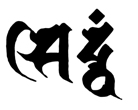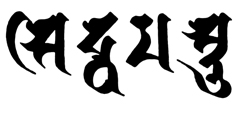I think we should be clear that these forms are just wrong, and that a mistake repeated for 1000 years is wrong on a much larger scale. Everything that is faulty with religion is summed up in this idea that we should simply accept something we know to be erroneous because 'that's how we've always done it'. The whole point of retaining the Siddhaṃ script in East Asia was in order to preserve the Sanskrit pronunciation. As Kūkai himself says:
"The mantras, however, are mysterious and each word is profound in meaning. When they are transliterated into Chinese, the original meanings are modified and the long and short vowels are confused. In the end we can get roughly similar sounds but not precisely the same ones. Unless we use Sanskrit, it is hardly possible to differentiate the long and short sounds. The purpose of retaining the source materials, indeed, lies here." - Kūkai. Shōrai mokuroku. Hakeda. Kūkai: Major Works, p.144.What's more these are elementary mistakes, one's that even with a little Sanskrit anyone can see. So, let's correct them.
Siddhāṃ is wrong because siddhaṃ is a neuter word and the form should be siddhaṃ with a short a. This is precisely the kind of problem with long and short vowels that Kūkai had in mind I think!

siddhaṃ
Siddhāṃrastu is wrong again because of the long ā, but in addition because there is no word 'rastu'. Judging from the translation 'may there be perfection' we can guess that what is intended is the word astu. This is the 3rd personal singular imperative of the verb √as 'to be' and means 'may it be'. Where the ra comes from is a mystery, and it renders the phrase meaningless. The correct form (with sandhi) is siddhamastu.

siddhamastu
Namaḥ sarvajñāya siddhāṃ presents more of a challenge. Steven's translation is 'homage to the all-knowing perfection'. Here sarvajñāya represents a kind of false Sanskrit - it uses the idea that if you just add -ya onto a word it makes it into the dative case indicating 'to' or 'for'. We find this in the homage 'namo buddhāya' for instance, which works OK because Buddha is a masculine noun in -a. But jñā is a feminine noun in -ā, and the dative would be jñāyai. This form is found in the homage to the perfection of wisdom for example: oṃ namo bhagavatyai prajñāpāramatāyai. But in a sense this is beside the point because the word is clearly intended to from a compound with siddhaṃ. 'The all-knowing perfection' would be sarvajñāsiddha - taking it as a karmadhāraya compound. In this case the first element loses it's case endings and only the second element is declined. In this the dative form would be: sarvajñāsiddhāya. So the correct form of this would namaḥ sarvajñāsiddhāya. There is an option sandhi here which would affect the final visarga in namaḥ giving namassarvajñāsiddhāya.

namaḥ sarvajñāsiddhāya
I note btw that Sacred Calligraphy seems to be out-of-print. It is selling on Amazon UK for £30 second-hand and up to £150 new! The RRP is US$32.50 on my copy (about £20). This is outrageous and I can only hope that Shambala Publishing opt to reprint soon!

No comments:
Post a Comment